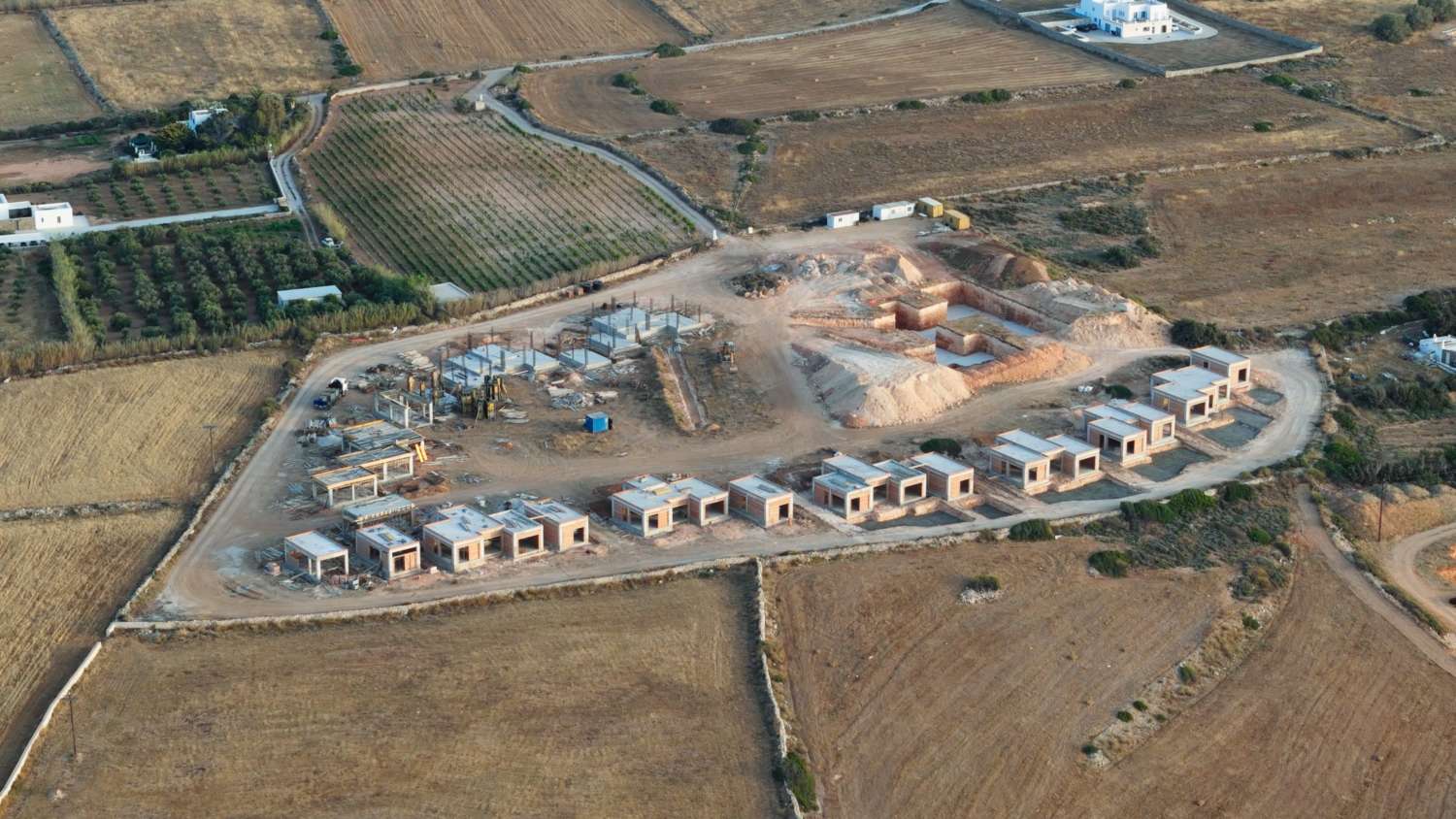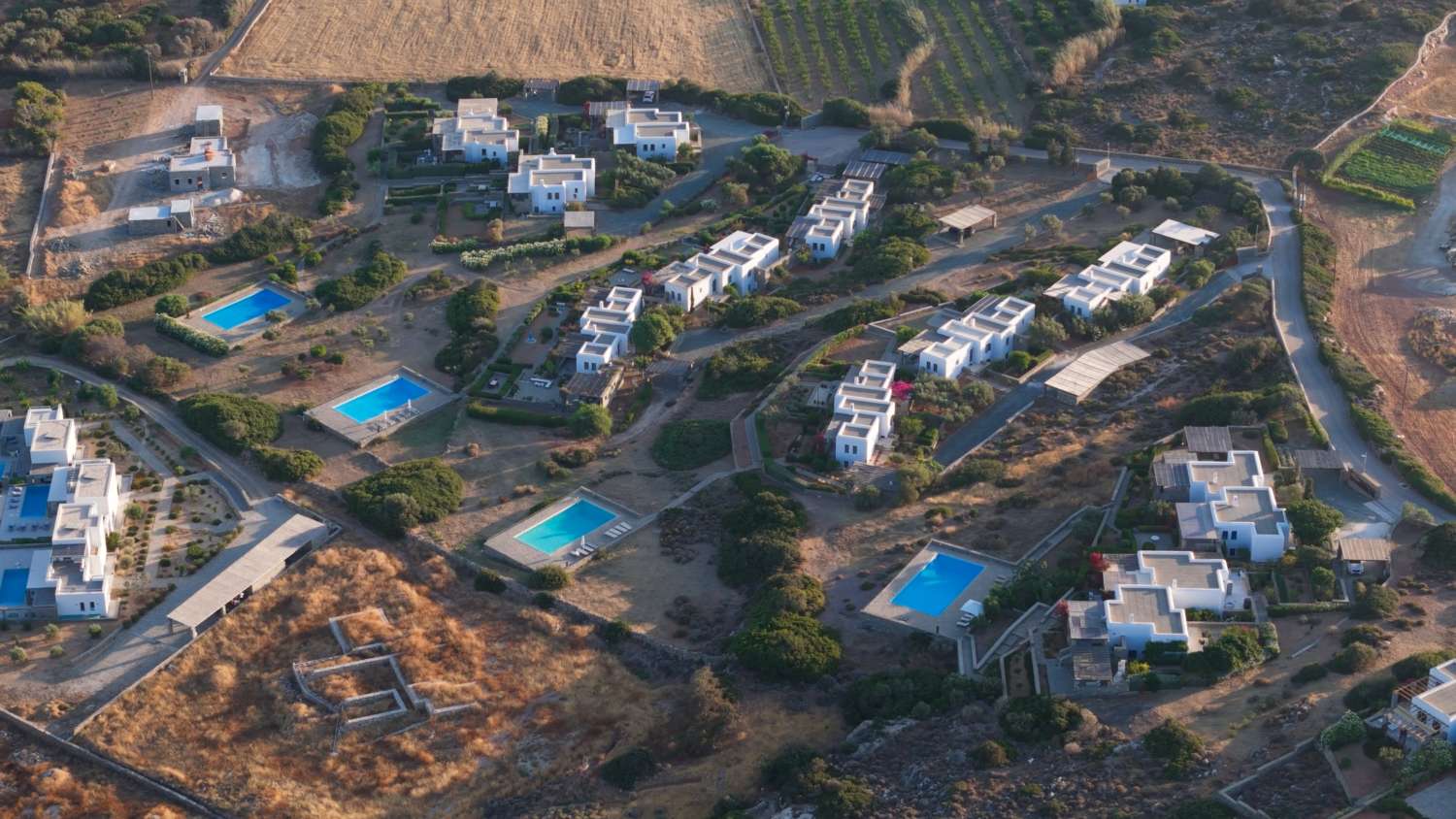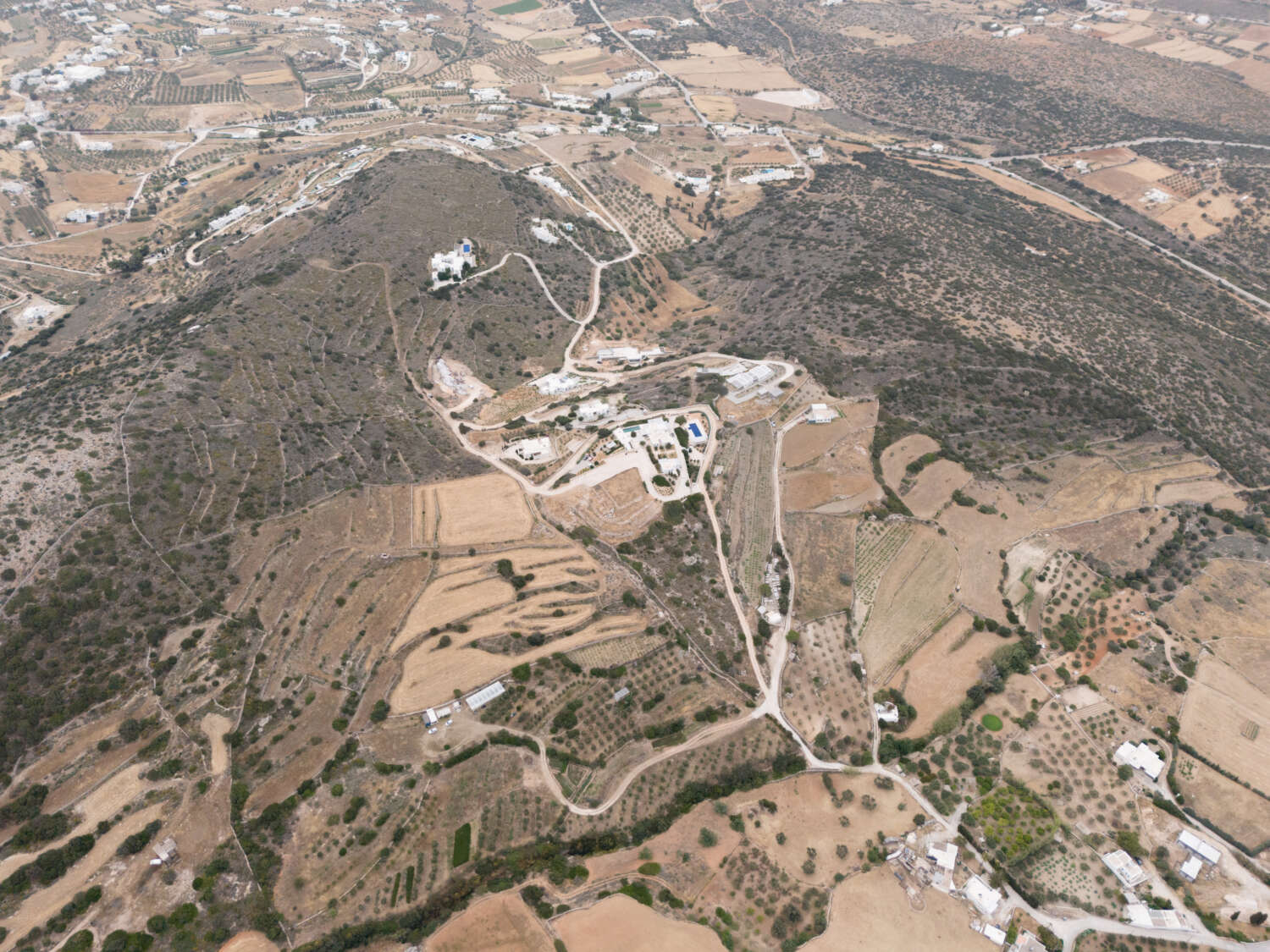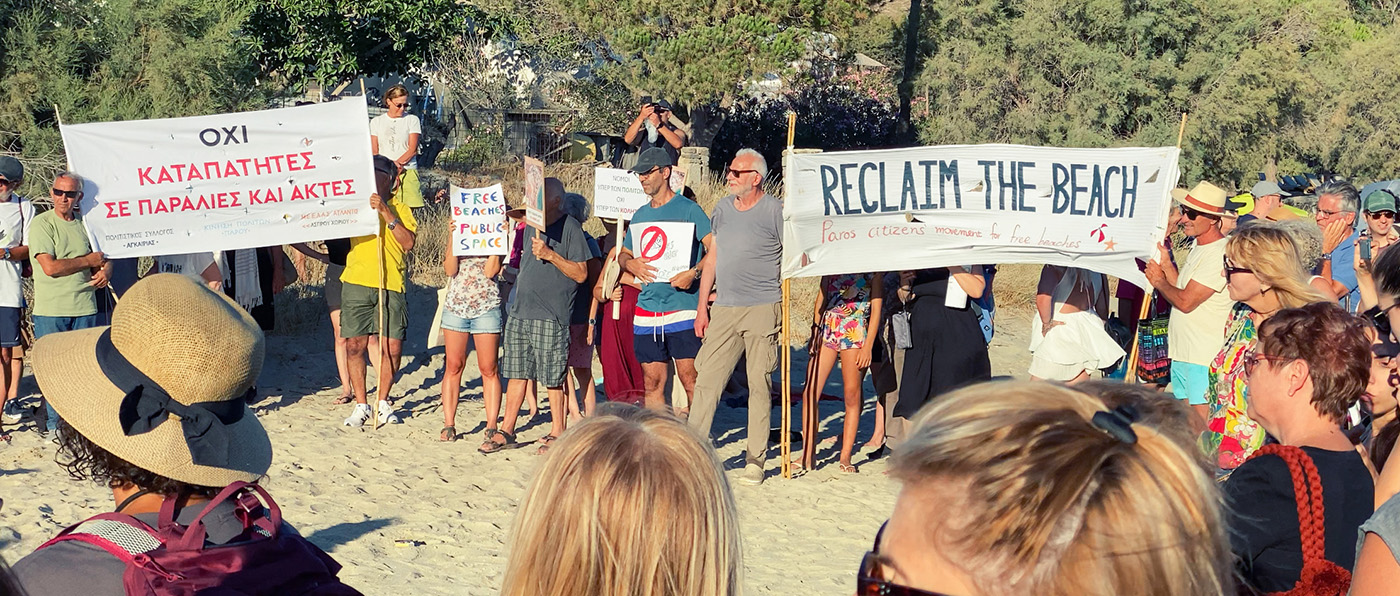Tonia Pantelaiou, November 2024

1. The recent past: Tourism in the Cyclades
The Cyclades, as a province of our hyper-centralised country, remained forgotten by the central state until the 1970s. This had unpleasant consequences for the inhabitants of the islands, who felt indifference towards their most important needs, but it also had a very positive effect: at a time when large parts of the country were being massively and brutally urbanised, while the country was moving forward with uneven and hasty steps in this peculiar model of uneven and opportunistic “development” dictated by all the historical and political conditions, the Cyclades (as well as many other Greek regions) had the advantage of remaining very largely outside of it, thus keeping alive and unchanged most of their identity characteristics, environmental, social and cultural, and preserving intact their stunning landscape – which is always the level on which the synthesis of natural geomorphological features with human history is inscribed in relief.
From the 1970s onwards, the islands have seen the emergence of tourism. Mainly and initially by European travellers, mostly French and Germans, who discovered the enchanting and liberating simplicity and vitality of a place that was luminous and transparent, which spread its simple lines between the deep blue of the sea and the blue of a permanently clear sky and generously offered unique experiences of flavours, aromas, colours and sounds. These first visitors came alone, guided by some early references to the Cyclades by artists and intellectuals who had already known and loved the place, but also by that need for escape to exotic places that was already developing in Western European countries and the USA since the 1950s and 1960s. And in any case, without any conscious state policy intervening. Tourists back then travelled on the small, poor ships of the line, slept under the stars or in whatever rooms the locals could provide, ate whatever the vegetable gardens produced and enjoyed the seas, the sun and the endless little secrets of the Cycladic wanderings among the dry land, the dry stone walls and the picturesque settlements, so receptive to human presence and common life.
The Cyclades were established as a special tourist destination. The once-forgotten province took on the colour of a dream, and from a certain point onwards, this began to have economic effects that could not be ignored. The Cyclades, which had always been golden because of its sun, now became golden in other ways.
Soon enough, foreign tourists were followed by Greeks from all parts of the country, but especially from Athens, which was already acquiring the characteristics of a suffocating metropolis and from which access to the Cyclades was always easy. The Cyclades were established as a special tourist destination. The once-forgotten province took on the colour of a dream, and from a certain point onwards, this began to have economic effects that could not be ignored. The Cyclades, which had always been golden because of its sun, now became golden in other ways. Naturally, this was a welcome development, at least at first, for the islanders, who saw their old rooms transformed into an important source of income, their agricultural and livestock products in demand, and their children no longer emigrating for the sake of survival, but making a living from a variety of tourism-related activities – agencies, restaurants, shops, small hotels….
In the 1990s, the difference in the standard of living of the inhabitants, but also in the landscape, was noticeable. The centre of economic life had already shifted from farming to tourism. The population of the islands showed clear growth trends. The islands had largely moved away from their former isolation, ferry links had become much more frequent and easier, and airports were being built on some of the islands. And, of course, there was a significant increase in construction. Locals built bigger and more houses, but many foreigners also decided to consolidate their relationship with the Cyclades, either by building holiday homes or by deciding to settle permanently. The overall increase in opportunities, both in tourism and in the construction industry, brought two other groups of people to the islands: Greeks from other parts of the country, who settled or invested permanently or semi-permanently in the islands (and especially in the more “touristic” ones), since the islands offered an ever-expanding market and, at the same time, living conditions that were in many ways better than those in Greek cities or other poorer provinces; and Europeans, who bought property and established a more permanent relationship with the islands.
As a result, construction on the islands increased significantly, in line with the development of tourism. Until the 1990s, however, the situation was not particularly problematic. There were already significant legal safeguards to protect the Cycladic landscape. Many important settlements had been declared traditional, and there were detailed conditions for their protection; special standards were established for newer buildings so that they did not deviate brutally from the Cycladic architectural tradition, and even entire island areas were declared protected, either as sites of archaeological importance or as sites with special geophysical characteristics. In addition to these legal restrictions, homebuyers themselves, whether old or new residents, did not want more than a house that could meet basic modern housing needs. So, despite the fact that the 1980s and 1990s saw a significant increase in building on most of the islands, and despite the fact that much of it took place outside the residential centres, which already worried some sensitive people about the impact on the island landscape, one could not speak of a ‘destructive’ dynamic. On the contrary, the overall picture was one of progress and prosperity. With some ‘collateral damage’, of course, but that seemed secondary to the excitement of God-given economic prosperity.
2. The current situation: Overbuilding and endangering natural resources
The dangers for the Cycladic islands come mainly from the tight embrace of the tourist interest with the building interest. And it is the latter that gives the catastrophic prospect of the irreparable

Since the beginning of the new century, however, things have taken a completely different direction, certainly not unrelated to the general developments in the country, Europe and the world. A direction that began to emerge with the purchase of land on the islands and the building of huge houses, mainly holiday homes, in the first decade of the century and evolved into the infiltration of huge funds of the international real estate market, while in recent years it has taken the form of an official and organised government policy, which seems to identify ‘sustainability’ with ‘investment’ in Cycladic land. What exactly does this new direction consist of? The fact that tourism in the Cyclades now seems to be inextricably linked to the sale of land. The Cyclades are no longer selling the beauty of their landscape. They are selling the landscape itself. And with it, their soul.
The Mykonian poet Kusathanas wrote about Mykonos:
Many times the place and its people have suffered. But to be sold?
Mykonos preceded the catastrophic course and, like Santorini, is already at a very heavy burden. The same picture does not apply to all the islands. Some of them, especially the more remote ones, remain largely unscathed to this very moment. But, and how much longer? The quality of the destructive dynamic is the same for all islands. And it does not come so much from the large concentration of people in the summer months, that is, from what we call over-tourism. The dangers for the Cycladic islands come mainly from the tight embrace of the tourist interest with the building interest. And it is the latter that gives the catastrophic prospect of the irreparable, all the more so if the anticipated effects due to the climate crisis are added to the picture. Even if tourism could at some point be halted or reduced, the sale of land and, even more so, the depletion of the natural resources associated with it, in other words, its destruction, creates irreversible facts.
3. The social impact
The inhabitants of the islands are rapidly losing the quality of their simple daily lives. Simultaneously, the landscape is losing the unique natural and man-made features that once defined it

Of course, Cycladic land is now being sold at a high price. Many of the locals who owned land and have not yet sold it have every reason to be excited about the turn of events. Equally excited are those who have come to the islands to take advantage of the opportunities offered by the Greek Eldorado. Estate agents, engineers, lawyers, contractors, builders and various types of tourism entrepreneurs, the vast majority of them see no problems, on the contrary, they see great opportunities in building on the islands. The more, the better.
But there are others, many others, who remember the past, resent the present and fear the future. Because if you widen your perspective a little, if you shift the focus from the immediate monetary gain to the more general, long-term, overall picture, you see that any gains have less and less to do with the inhabitants of the islands, less and less to do with the well-being of the local communities, and more and more to do with the accumulation of serious and intractable problems that in many islands are already bordering on permanent and irreversible destruction.
In one of the first collective texts of reaction of the islanders, a text signed by the associations of Naoussa Paros in November 2022 and addressed to the government, the MPs and the local government, some of these problems are listed as follows:
- Very high cost of living which makes the life of people with average and low income particularly problematic
- Buildings that consume all open space, creating aesthetic abominations incompatible with the spirit of Cycladic architecture.
- A severe test of all the fragile infrastructure of a small place (roads, water management, waste management)
- Widespread lawlessness
- Gradual loss of morality, simplicity, moderation, humility and the spread of a spirit of ostentation and megalomania.
- This situation threatens to make many of the permanent residents of Paros pariahs in their own place, while at the same time repulsing the best and most loyal friends and visitors of Paros…
Two years after the publication of this text, although there have been no changes in central policies that continue to follow the well-known model of unsustainable exploitation, the issues identified by the associations of Naoussa have not only persisted but have also become significantly worse.
The inhabitants of the islands are rapidly losing the quality of their simple daily lives. Simultaneously, the landscape is losing the unique natural and man-made features that once defined it. Although tourism and construction are booming, the profits are contributing less and less to the local community’s well-being. Small businesses are struggling to survive as larger companies encroach upon all sectors of the economy. Furthermore, essential resources like water are showing alarming signs of depletion.
The Cycladic architecture has always captivated people due to its unique blend of nature and human needs, striking a balance between modest private spaces and essential communal areas. However, this has been overshadowed by the emergence of massive and imposing modern constructions. These new buildings show a complete disregard for the island’s scale and the limitations of the natural environment, prioritizing the private over any sense of community.
The unique Cycladic settlements, while preserving their morphological characteristics due to their strict legal protection, lose their functionality and disappear behind unmanageable housing extensions.
The countryside, once characterised by the purity and harmony of its lines and colours, is increasingly taking on the image of urban suburbs, characterised not by the colours and levels of the hills and fields, but by buildings and disconnected roads.
The starry nights are lost behind the omnipresent artificial lights, the ancient sounds of bees and cicadas are drowned out by the noise of cars, ships, aeroplanes, excavators and loudspeakers.
The simple daily routine that used to be organised according to the changing seasons has been replaced by the rhythms, intensity and working conditions of a metropolis, which characterise the peak summer period and alternate with the deadness of the winter season.
The character of our islands has changed significantly. Alien elements with dangerous characteristics have emerged, which are entirely contrary to what has shaped their unique identity. These elements pose a severe threat to what has made the Cyclades a cherished destination. Everything that poets, filmmakers, and ordinary people from around the world have admired—everything that has supported life on these islands for thousands of years—is now vanishing without any hope of restoration.
4. The resistances
In 2023, we witnessed the rise of citizens’ movements advocating for recognition of these rights. In Paros, Amorgos, Syros, Tinos, and Naxos, various groups of citizens are advocating for a model of soft tourism that emphasises integration rather than domination over the traditional social and natural forms that support island life.

This situation brings to light several important issues regarding the rights of citizens and inhabitants. Currently, the dominant narrative tends to prioritise land ownership rights alongside the needs of businesses. However, we must ask: how can these rights be considered more important than the right of people to live safely in their own place? How can they outweigh the need for individuals to freely access natural resources, such as water, in their place? How can they take precedence over people’s right to enjoy the island environment, which includes its seas, stunning views, tranquillity, and unspoiled connection with nature? Moreover, how can the expansion or utilisation of private property be prioritised over the preservation of ancestral communal lands? To what extent should the growing trend of private ownership of isolated structures override the broader need for security and protection?
In 2023, we witnessed the rise of citizens’ movements advocating for recognition of these rights. When discussing our right to access beaches, we raised a fundamental question: does this magical place belong to us? If it does, as clearly stated in the Constitution and laws, why do we feel as though we are being deprived of it? Why are some people trying to push us away from our own sandy beaches, our own tamarisk, and the landscapes that have nurtured and embraced us for as long as we can remember?
This year, we have broadened our focus from the beaches to the mountains and plains, extending our concerns to the land that is being paved and the subsoil that is becoming dry and arid. We ask: Which is more important? Providing water for the swimming pools and gardens of wealthy settlers, or ensuring access to drinking water and sufficient resources to care for our crops? Should we prioritise selling our land, or should we foster conditions that allow local communities to thrive while caring for our ancient environment? These goals cannot all be pursued simultaneously; they are mutually exclusive. We urge that construction outside the established settlements be stopped or significantly reduced. We call for the abolition of any initiatives related to ‘strategic investments’ in tourism. We call for the strengthening of those infrastructures that will protect against floods and heat waves and not for the creation of infrastructures to withstand even greater tourist and residential pressure.
The islands, long before they became a battleground for economic interests, were home to a unique biodiversity and communities that cherished them. These communities now assert their rightful place on the islands. Increasingly, groups of citizens are emerging, determined to respond to policies that promote the encroachment of large capital into the land market for tourism and housing.
In Paros, Amorgos, Syros, Tinos, and Naxos, various groups of citizens are advocating for a model of soft tourism that emphasizes integration rather than domination over the traditional social and natural forms that support island life. These groups include the Citizens’ Movement of Paros, the Citizens’ Movement of Naxos for the Beaches, Batiki and Ambassada in Tinos, Mitato in Amorgos, the Association of Iosians, Save Ios, in Ios, the Environmental Observatory in Syros, and the newly established Network for Sustainable Cyclades. This network unites the efforts of each island into a common front aimed at preserving Cycladic identity.
These groups are not just reacting to harmful practices; they are actively seeking to promote sustainable solutions that maintain the islands’ valuable characteristics. Their goal is to present the islands as attractive destinations rooted in their unique natural gifts, rather than allowing them to suffer degradation.
A crucial aspect of protecting the islands is the strict limitation of unsymmetrical construction, particularly off-plan building. This position is supported by the Council of State Decision 167/2023, which reminds us that off-plan building has been banned since 1985. However, this decision, along with many other legal safeguards, is often ignored on the islands. It is evident that the force of unchecked development is stronger than the existing legal framework.
It is only a matter of time: Will we be able to preserve the identity of our islands, or will hegemonic politics and international markets impose their destructive choices? This situation also raises the question of how we can strengthen and develop our collective response. How many of us truly believe in this cause? How many are willing to join the effort? What healthy and determined forces can we activate within local communities? While no one can predict the course of history, each of us can contribute in our own small way.

Very well compiled article.. I live above Marseille beach and am surrounded.. by new concrete complexes., 35 years ago we had 360 view if just farm land and hillside shrubs.. now it resembles an overbuilt housing estate..
Thank you Tonia, you have our full support and agreement.
We spend 3 months in Paros every summer and have been coming since 1988 so we have closely observed what is happening.